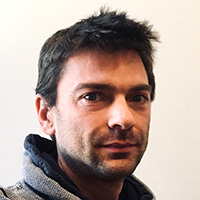Sylvain Delagrange
Professor of Functional Ecology and Plant Ecophysiology

819-595-3900 #2934
Research themes
Plant functional ecology, primary growth and architecture, forest ecophysiology, plant phenotypic plasticity, gas exchange and carbon balance, tree response to stress, acclimatizing to a changing climate
Education
- 2004-2005 : Postdoctoral internship in ecology and forest ecophysiology – Université du Québec à Montréal
- 2000-2004 : Doctorate in ecology and forest ecophysiology – Université du Québec à Montréal (co-supervised by the University of Nancy)
- 1999 : Diploma of Advanced Study (DEA) in forest biology – Université de Nancy (France)
- 1996-1998 : Bachelor’s and Master’s in Animal and Plant Physiology – Université d’Orleans (France)
- 1994-1996 : University Graduate of Technology in Food Industries and Biotechnology – Institut Universitaire de Technologie de Caen (France)
Description of research
My work focuses on understanding the link between the functional traits of plants and their ability to adapt and acclimatize. While carrying out my different projects, I have been able to develop expertise related to (i) plant ecophysiology and phenology, (ii) measurement, 3D reconstruction and analysis of tree architecture, (iii) the plasticity of plants in response to silvicultural treatments, and (iv) the ecosystem services rendered by plants in an urban context.
Functional ecology : In this research theme I am interested in understanding the establishment and development of regeneration of forest species in a natural or urban environment. Indeed, by exploring the combinations of physiological, morphological and architectural traits expressed by trees during their development, it becomes possible to better understand the mechanisms of competition between species, their ability to acclimatize to different environments and their capacity to respond to disturbances in the environment or global changes.
Remote Sensing and Modeling : In this research theme, I am exploring measurement and modeling methods for an innovative study of the development and functioning of the tree as a complex and organized modular organism in a 3D environment. In particular, I have developed an expertise in the use of terrestrial LiDAR technology for the reconstruction of tree architecture, especially with the PypeTree platform.
Intensive sylviculture : In this area, my work aims to better quantify the yields of monocultures or mixed plantations and their potential for use in the Outaouais region and elsewhere in Quebec. The use of plantations under intensive silviculture is indeed an attractive option for increasing yields and protecting mature forests. However, these plantations can offer many more ecological services than simply wood fiber, and can be used for multiple purposes such as restoration, protection of riparian buffers, as well as preservation of noble species or creation of windbreaks.
Other links :
Capital Nature, a community-supported research platform to acquire knowledge on the ecological services provided by deciduous forests and promote green infrastructure in urban areas
The CRSNG / Hydro Québec / UQAM Research Chair on tree growth control.
The Centre d’Étude de la Forêt, is a unique group of researchers from Quebec working in the fields of biology, ecology and forest management.
-
add removeKey publications
- Lecigne, B., Delagrange, S. & Messier, C. 2018. Crown reaction and acclimation to cyclical V-trimming of city trees: An analysis using terrestrial laser scanning. Urban Forestry & Urban Greening 29 : 183-191.
- Buissart, F., Vennetier, M., Delagrange, S., Girard, F., Nicolini, E.-A., et al. 2018. The relative weight of ontogeny, topology and climate in the architectural development of three North American conifers. AoB PLANTS 10.
- Muhr, J., Messier, C., Delagrange, S., Trumbore, S., Xu, X., et al. 2016. How fresh is maple syrup? Sugar maple trees mobilize carbon stored several years previously during early springtime sap-ascent. New Phytologist 209 : 1410-1416.
- Delagrange, S., Jauvin, C., Rochon, P. 2014. PypeTree: A Tool for Reconstructing Tree Perennial Tissues from Point Clouds. Sensors 14 : 4271.
- Delagrange, S., Messier, C., Lechowicz, M.J. & Dizengremel, P. 2004. Physiological, morphological and allocational plasticity in understory deciduous trees: importance of plant size and light availability. Tree Physiology 24 : 775-784.
-
add removeProjects (coming soon)
-
add removeStudents and postdoctoral fellows
Étudiants actuels
Doctorat
- Bastien Lecigne
- Guillaume Perrette
Maîtrise
- Maxime D’Amour
- Michel Guarinoni
- Romain Jeager
Étudiants diplômés
Stagiaires postdoctoraux
- 2014 Fahad Rasheed
- 2014 Olivier Taugoudeau
- 2010 Alain Paquette
- 2009 Jari Pertunnen
Maitrise
- 2014-2016 Christian Ruiz
- 2015-2017 Cédric Bertrand
- 2016-2018 Laurence Larose
- 2010-2013 Bastien Lecigne
- 2009-2012 Jean-Bastien Lambert
- 2008-2012 Kim Bannon
-
add removeAvailable projects
- Maitrise en écologie fonctionnelle végétale
- Maitrise en études des services écosystémiques en milieu urbain
- Maitrise sur la phénologie du développement des essences feuillues
- Doctorat en écologie fonctionnelle végétale
- Doctorat sur la phénologie du développement des essences feuillues
Contacter : sylvain.delagrange@uqo.ca
arrow_backBack to Team
